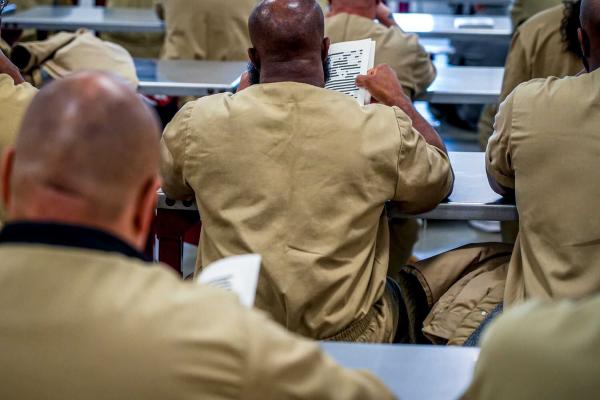Architect of Puritanism, inventor of the Protestant work ethic, forerunner of cancel culture: John Calvin’s list of supposed offenses stretches longer than his Bible commentaries.
In a recent interview with Cornel West, Atlantic staff writer Emma Green suggested that a form of “secular Calvinism” is at work among white leftists who now see themselves, and other white people, as “stained with sin before [they’re] born,” lacking “power to change [their] sinfulness.” Similarly, Green’s Atlantic colleague Anne Applebaum saw the enduring legacy of the Calvinist-descended Puritans (and their Scarlet Letter-esque shunning rituals) at work in cases like Donald McNeil’s firing from The New York Times for using the N-word, or Yale’s investigation into the alleged indiscretions of law professor Amy Chua, who popularized the stereotype of the Asian “tiger mother.”
As a post-evangelical, I have no interest in rehabilitating Calvin’s ideas about double predestination or his justification for the execution of Michael Servetus. Nonetheless, I’m unwilling to cast Calvin and his theological legacy in exclusively negative terms; I believe that confronting racial injustice today actually requires recuperating Calvin’s infamous doctrine of “total depravity,” or a spiritual condition staining humanity from birth. Doing so can help us better understand why both progressive and reactionary heirs to Calvinist thought fall short — and how we might work to transform our fallen world instead.
Consider theologian James H. Cone, who described lynching as America’s “original sin,” thereby integrating the idea of total depravity with an analysis of systemic racism — or racism that continues to manifest itself in laws, courts, schools, and health care. In The Cross and the Lynching Tree, Cone argues that the United States’ sinful legacy of racism alienates people from each other and from the God who stands in solidarity with the oppressed. For Cone, rescue from this depravity could only be found in Black liberation, fueled by Christ’s crucifixion: an act of divine solidarity with all who “suffer[ed] on lynching trees.”
Cone’s analysis of lynching and racism extends Calvin’s vision of a corrupt tendency festering beneath apparent order and virtue. Though total depravity is often misunderstood as a description of maximal evil, Calvin used the phrase to name a distortion abiding throughout our world. According to Calvin, the only reason this distortion doesn’t erupt into chaos everywhere is because God’s providence “curbs the perverseness of nature, preventing it from breaking forth into action.” Thus, trying to defeat a latent enemy in seemingly upright individuals and institutions by “being good,” or even “feeling guilty,” doesn’t work; only radical grace can subdue the ever-present monster Calvin describes as a “hydra [that] lurks in every breast.”
Unlike the popular caricatures of Calvinistic theology that Green and Applebaum paint, Calvin depicts total depravity as a corruption so thorough that it stains not only individual people, but also the systems and structures they create. Ironically, these systems can display depravity precisely through misguided efforts to eradicate that depravity. Hence, what Green and Applebaum decry as the “secular Calvinism” or “New Puritanism” might be better understood as a kind of pseudo-Puritanism that is fixated on avoiding wrongdoing rather than advocating for transformation. This pseudo-Puritanism is absorbed in a personal holiness that doesn’t do justice to how Puritan thought eventually influenced social issues, like abolition.
In other words, Calvin’s thought actually affirms some of Green and Applebaum’s criticisms of white progressivism. If total depravity warps virtually everything that humans touch, including our most cherished institutions, we can’t vanquish the hydra of racism by celebrating how Teen Vogue editor Alexi McCammond was pressured to resign after anti-Asian and homophobic tweets she made in 2011 resurfaced. Nor can we defang the monster by merely condemning Princeton professor Joshua Katz, for denouncing an anti-racist letter signed by his colleagues. As guilty or wrongheaded as these individuals might be, fixating on them alone allows the status quo — and the systemic lynching the status quo enables through current carceral, medical, and educational policies — to thrive.
However, the sheer scale of total depravity also reminds us that these rituals of coercive moralism don’t just originate from anti-racist activists; debased versions of Puritan zealotry are also evident among those working to preserve a white-dominant status quo. Amy Chua, who Applebaum cited as a target of progressives, once threatened to “call every justice on the Supreme Court” to make sure they shunned a Yale Law student. The student’s crime: criticizing Chua’s husband for a right-leaning attack on campus sexual assault policies. Given that Chua prides herself on mentoring students of color, it’s not hard to see how such threats pressure the next generation of Black, brown, and Asian lawyers to defer to Yale’s white male-led establishment. More recently, the “China Initiative,” a Sinophobic project of the Department of Justice, has destroyed the livelihoods of Chinese academics over false accusations of espionage. This organized xenophobia originated under Trump and has now continued into Biden’s administration. If the hydra lurks in every breast, then attending only to anti-racist pseudo-Puritanism exposes just one head of the beast.
So how do we exit the nightmare of total depravity, particularly when it’s disguised in expressions of righteousness? Marilynne Robinson, a Calvinist, insists that this doctrine must be understood in light of Calvin’s “rapturous humanism,” which celebrates humanity as “a workshop graced with God’s unnumbered works.” In Calvin’s reckoning, the soul’s workshop of creativity, perseverance, and sheer sublimity is more foundational to humanity than depravity; our ongoing capacity to produce such gifts should prevent us from settling for performing allyship at anti-racist workshops.
For us, this means recognizing that humanity’s “workshop of grace” offers its highest fruits in Black civil rights leaders, Latin American radical priests, Hong Kong protesters, and white antifascists — people who all assert that depravity’s effects on the oppressed require a radical transformation of our world. Their activism embodies the “mediating stage of conversion and transformation” that West names as a corrective to white liberal fatalism. It’s a grace with which, I believe, Calvin would be proud to associate himself.
In that light, maybe the solution to the problem identified by Green and Applebaum isn’t to disown Calvin or his analysis of original sin. Rather, we might embrace Calvin’s insights regarding total depravity and the grace required to overturn it. Amid a tidal wave of domination and exploitation, Christians believe that such grace ultimately reaches humanity through a God who predetermines to dwell amongst those who liberation theologians call “the crucified of history.” Instead of encouraging an impulse to shun, a proper understanding of total depravity demands that we embrace those already shunned: the “least of these my brethren” with whom Christ, in his execution at the hands of an antisemitic imperial state, so emphatically identified (Matthew 25; 27:37). Through similar identification, we might find ourselves elected to ever deeper kinship with the crucified God who calls us, once and for all, to behead the hydra.
Got something to say about what you're reading? We value your feedback!







